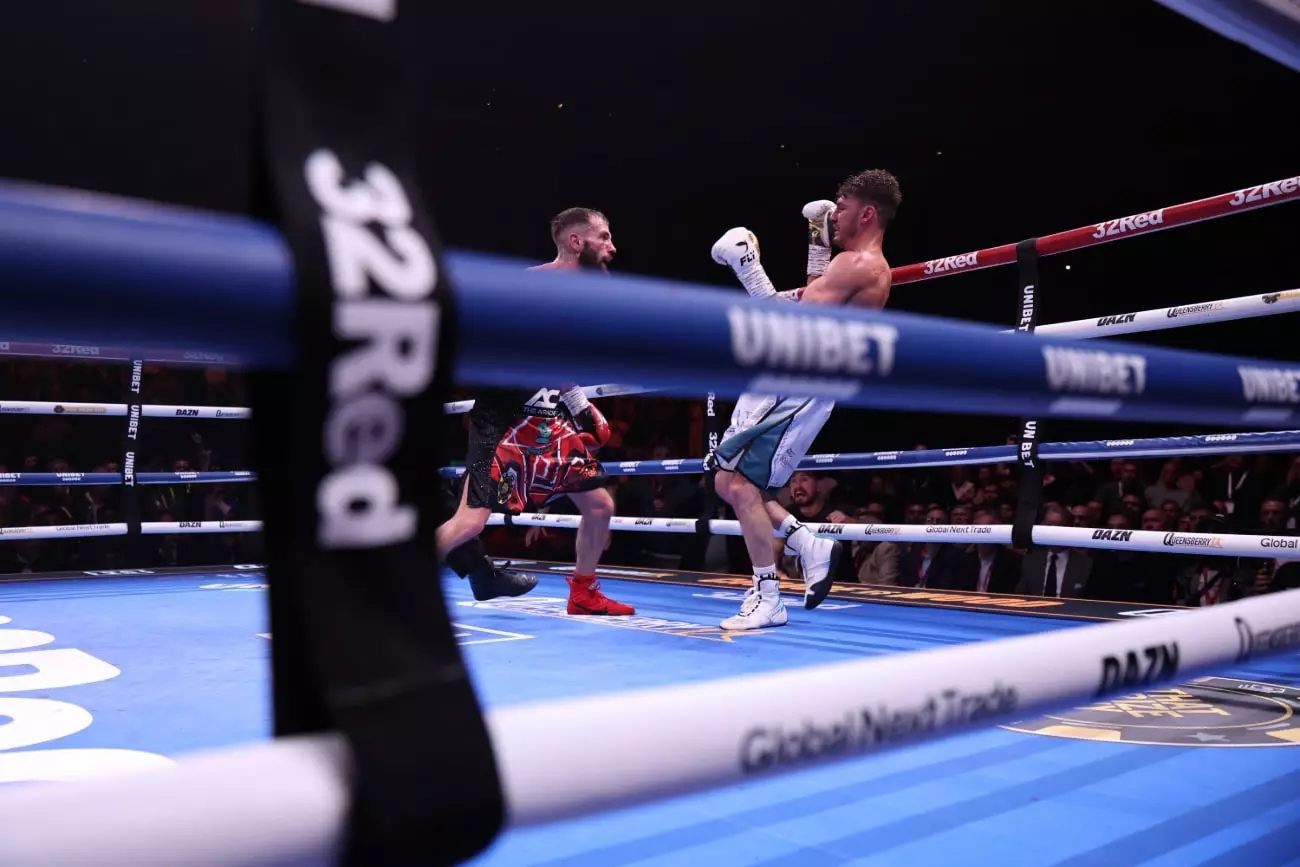In an unforgettable showdown at Nottingham’s Motorpoint Arena, IBO super featherweight champion Anthony Cacace proved beyond a doubt that he possesses both technical prowess and fighting intelligence. Cacace, boasting an impressive record of 24 wins with only one loss and 9 knockouts, showcased a performance that was as strategic as it was brutal, defeating former two-time WBA champion Leigh Wood (28-4, 17 KOs) by a ninth-round technical knockout (TKO).
Cacace, recognized for his ability to adapt and exploit his opponent’s vulnerabilities, entered the ring with a clear game plan. His mastery of the jab established early dominance while his impressive switch-hitting kept Wood guessing throughout the fight. As the rounds progressed, it was evident that Cacace had prepared meticulously, capitalizing on Wood’s sluggish movements—a direct consequence of his lengthy 19-month absence from the ring. The fight revealed not just a champion’s flair but also foreshadowed potential challenges for Wood, who struggled to find his rhythm.
Leigh Wood: A Fighter’s Heart, but an Outdated Strategy
On the opposite side, Leigh Wood exemplified heart and determination, traits often celebrated in the sport of boxing. However, the fight accentuated a significant issue—his strategy lacked both depth and adaptability. Wood, with his years of experience and accolades, failed to adjust to Cacace’s relentless assault. The bout’s eighth round, often considered pivotal, further emphasized this miscalculation. Wood’s corner believed he had finished on a high note, but the reality painted a stark contrast; he was battered and on the verge of succumbing to defeat.
Trainer Ben Davison’s optimism clashed with the grim reality of the fight, painting an unfortunate picture that can often be seen in combat sports; a refusal to acknowledge the slipping grasp on victory. The event raises questions about the balance between belief in one’s fighter and the need for critical assessment. For Wood, it was a moment of misjudgment that could have clouded the tactical decisions made in the ring—a misreading of the ebb and flow of the match that ultimately led to his downfall.
A Pivotal Moment: Why the Towel Was Thrown
As the ninth round unfolded, the fight reached its zenith of intensity. Cacace unleashed a flurry of punches that left Wood staggered and reeling, his body collapsing against the ropes—a visual metaphor for his crumbling resistance against a relentless opponent. This was the climactic moment that would culminate in the proactive decision made by Davison to throw in the towel, a decision that, while criticized by some, was a testament to protecting a fighter from unnecessary harm.
In boxing, the emotional and physical toll on fighters is extraordinarily high. The coach’s quick thinking to prevent further punishment for Wood illustrated a caring and strategic mindset. Wood, clearly troubled, had entered a phase where even a brief moment of respite could not salvage his performance. Davison’s choice arguably saved Wood from enduring further rounds of punishment, which could have lasting effects due to head trauma—a significant concern in the sport.
Reflections on Boxing’s Realities: Business vs. Readiness
Looking back at this bout, one cannot help but ponder the consequences of financial motivations in boxing. Wood’s choice to fight Cacace following a long break raises critical questions about the readiness of fighters. Financial incentives undoubtedly play a pivotal role in the decision-making process for professional athletes. However, it can be detrimental when the pursuit of a paycheck overshadows the considerations of timing and preparation.
With Cacace’s polished performance sealing the fate for this matchup, it’s clear that Wood faced a warrior who was simply on another level. The bout serves as a stark reminder that in the world of boxing, skill, timing, and strategic preparation are just as vital as heart and determination. Wood’s hasty decision to compete without the necessary preparatory fights will hopefully serve as a cautionary tale for up-and-coming fighters, urging them to prioritize their readiness over immediate financial gain.
This bout transcended its immediate result, becoming a significant reflection on the realities of boxing—both the glory and the grim consequences that accompany it. The beauty of the sport lies not only in the clashes of skill but also in the narratives of readiness, strategy, and the profound understanding of one’s own capabilities.


Leave a Reply